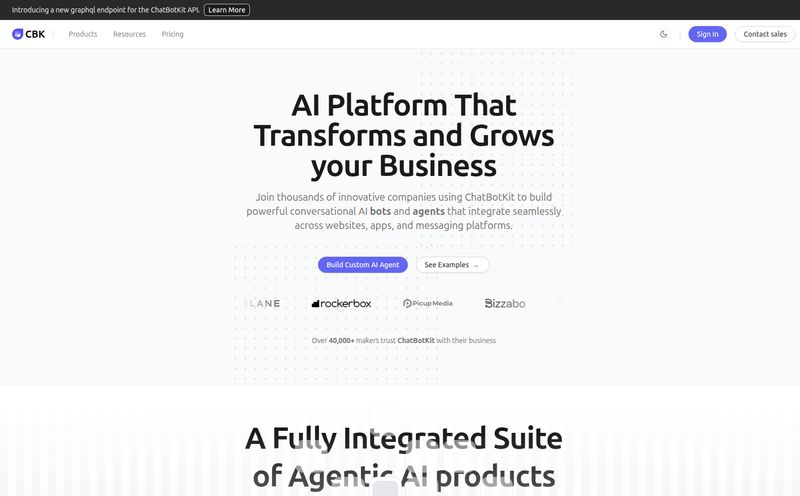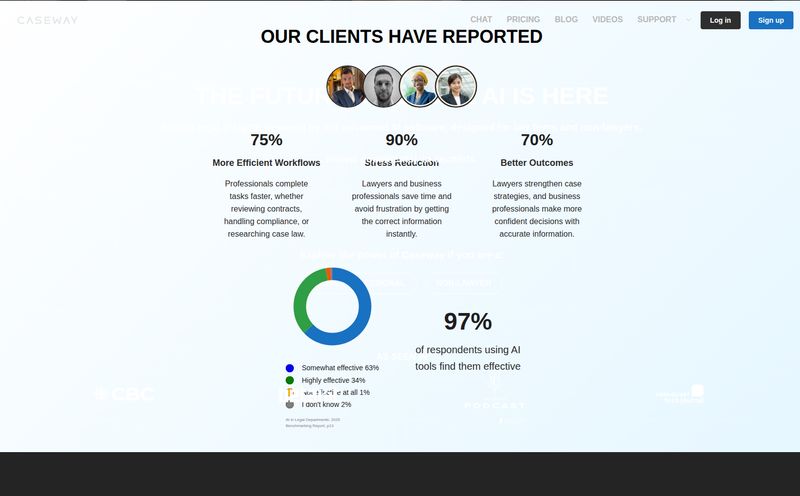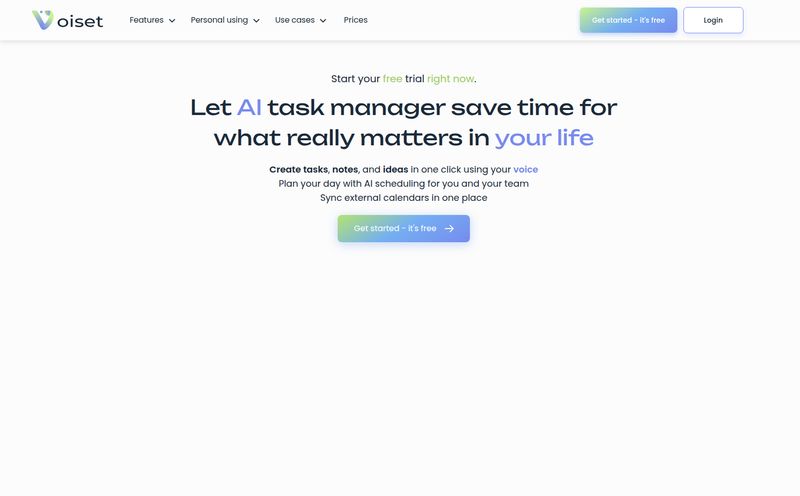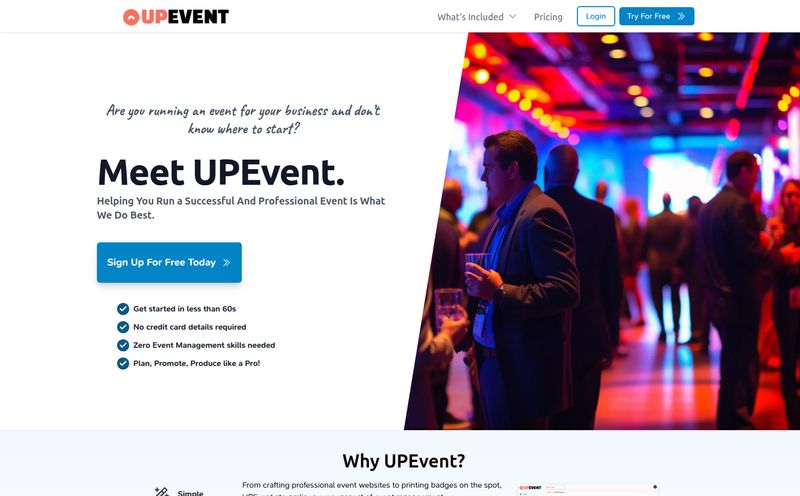If you're anything like me, your digital life is a meticulously organized catastrophe. I've got notes in Notion, half-baked ideas in Google Keep, research papers saved to a desktop folder ominously titled "READ LATER," and bookmarks that haven't been clicked since 2018. It’s a system, sort of. We call it a "second brain," which sounds impressive until you realize it’s more like a digital junk drawer.
For years, we in the SEO and digital marketing space have been trying to wrangle this beast. We build complex systems, we tag everything, we link notes together, hoping to create our own personal wikipedia. But it's always been a passive process. The knowledge just sits there until we go digging for it.
Then a tool like Parabrain lands on my radar, and I have to sit up and pay attention. The pitch is simple, but it’s a big one. What if your second brain wasn't just a storage unit? What if it had a brain of its own?
So, What Exactly Is This Parabrain Thing?
Forget everything you think you know about standard note-taking apps. Parabrain isn't just another place to dump your thoughts. It’s an AI knowledge platform where you actively train a personal AI on your own expertise. You feed it your notes, your articles, your research, your half-formed shower thoughts... and it learns. It becomes a digital version of you, an expert on the topics you know best.
Think of it this way: instead of just having a library, you now have a personal librarian who has read every single book, note, and scribbled-on napkin you've ever given them. And this librarian can not only find information for you but also connect disparate ideas, offer new insights, and even answer questions with the accumulated wisdom of your own work. It's a pretty wild concept.

Visit Parabrain
How the AI Magic Actually Happens
This isn't just smoke and mirrors; there's a tangible process here. And from what I've gathered, it’s broken down into a few fascinating components that set it apart from, say, just chatting with a generic AI.
Training Your Digital Doppleganger
The whole system hinges on one thing: your content. You have to upload your knowledge base—the papers, the notes, the documents that make you an expert in your field. This is the foundation. Now, let’s be real for a second. The old programming adage of “garbage in, garbage out” applies here more than ever. The effectiveness of your personal AI is going to be a direct reflection of the quality and depth of the information you provide. If you feed it vague, disorganized notes, you’ll get a vague, disorganized AI assistant. But if you give it your best stuff? That's when things get interesting.
I have to admit, the idea of uploading years of personal and professional notes gives me a slight pause. We're all a bit cagey about data privacy these days, and for good reason. I’d want to see a very clear policy on how that data is handled and secured before I hand over the keys to my entire professional kingdom.
The Virtual Mastermind Group
This, for me, is where Parabrain starts to feel less like a tool and more like a community. The platform allows you to connect with other users' AIs. Let that sink in. You could have your marketing AI chat with a finance expert’s AI, or a history professor's AI. It's like creating a virtual roundtable of experts who are available 24/7.
Imagine you're a PhD student working on a thesis. You could potentially consult a virtual tutor trained on a leading academic's entire body of work. The potential for collaborative learning and smashing through creative blocks here is just... massive. It's a whole new spin on networking.
Monetizing Your Gray Matter
And here's the kicker. The feature that probably made every consultant, coach, and creator's ears perk up. Parabrain suggests you can monetize your expertise. The idea is that you could charge others for access to your highly-trained, specialized AI. It's like bottling your brainpower and selling it as a service. This reminds me of the early days of Patreon or Substack, when creators found new ways to get paid directly for their value. It feels like the next logical step in the creator economy. Will it work? The jury is still out, but I'm fascinated to watch it unfold.
My Honest Take on the Good and the Not-So-Good
No tool is perfect, especially not a new one pushing the boundaries like this. I've been in the SEO game long enough to know that for every brilliant feature, there's usually a catch or two.
The upside is obvious and exciting. The thought of having an AI that genuinely understands the nuances of my work and can help me generate content, spot trends, or answer complex questions based on my own data is incredible. It’s the productivity boost we've all been searching for. The collaborative and monetization angles are not just features; they're potential new business models. It feels like a genuine step forward in how we interact with information.
But there are a few potential hiccups. As mentioned, the whole thing requires you to upload your personal and professional documents, which is a significant trust-fall. The platform is also apparently not available in all regions yet, so there's an access issue. And of course, its usefulness is entirely dependent on you. You have to be willing to put in the work to curate and upload high-quality content. It’s not a magic wand you can just wave for instant genius.
Who Should Actually Be Looking at Parabrain?
So, is this for everyone? Probably not. If you're a casual user who just needs to make a grocery list, this is definitely overkill.
- Academics and Researchers: Absolutely. Imagine training an AI on every research paper in your field. It could become the ultimate literature review assistant.
- Industry Consultants and Professionals: Yes. If you have decades of project notes, client reports, and industry knowledge, this could be a way to synthesize that wisdom and even create a new revenue stream.
- Content Creators and Thought Leaders: A thousand times yes. This is a tool that could help you repurpose content, answer community questions at scale, and build a product out of your intellectual property.
- Lifelong Learners: For the truly curious minds who absorb information like a sponge, this could be the ultimate tool for connecting the dots between all your varied interests.
Essentially, if your work or passion revolves around a deep body of knowledge, Parabrain is designed for you.
The All-Important Question of Price
Now, the part we all secretly scroll down to first. What's the price tag? As of right now, that information isn't publicly available. It's a new platform, and they're likely still figuring out their pricing model. I wouldn't be surprised to see a tiered subscription model—perhaps a free version with limited uploads, a prosumer tier for individuals, and an enterprise level for teams or for those who want to heavily monetize their AI.
Personally, I hope they offer a trial or a freemium plan. A tool this conceptual really needs a hands-on experience before most people will be willing to commit their cash, let alone their entire knowledge base.
Final Thoughts: Is Parabrain the Future?
Look, I see a lot of tools. Most are just slight variations on something that already exists. Parabrain feels different. It's ambitious. It’s a bit weird, in the best way possible. It’s asking us to fundamentally change our relationship with our own knowledge.
Will it succeed? I don't know. But it represents a shift in thinking that I believe is here to stay: moving from passive knowledge storage to active AI-powered wisdom generation. It's a bold idea, and even if Parabrain itself isn't the final form, it’s pointing the way forward. I, for one, am keeping a very close eye on it. My digital junk drawer might just become a goldmine after all.
Frequently Asked Questions about Parabrain
- What is Parabrain in simple terms?
- Parabrain is an AI platform that you train with your own documents, notes, and papers. It creates a personalized AI expert that can provide insights, boost productivity, and even be monetized by giving others access to it.
- Is my data safe if I upload it to Parabrain?
- This is a major consideration. While Parabrain is expected to have security measures in place, you should always review the platform's privacy policy and terms of service before uploading sensitive personal or proprietary information. As a rule of thumb, be cautious with any new platform.
- How is Parabrain different from something like ChatGPT?
- ChatGPT and other large language models are trained on a massive, general dataset from the internet. They know a little about everything. Your Parabrain AI is trained specifically on your data. It is a deep expert in your niche, using your context, vocabulary, and insights. It's the difference between a generalist and a specialist.
- Can I actually make money using Parabrain?
- The platform is designed with a monetization feature in mind. The idea is that if you are a recognized expert with a valuable knowledge base, you can charge other users a fee to interact with or get insights from your trained AI. Its success will depend on market adoption and the perceived value of your AI.
- Is Parabrain free to use?
- Pricing information has not been made public yet. It's likely the platform will have a paid subscription model, possibly with different tiers of service. A free trial or a limited free plan is also a possibility to allow users to test the service.
- What kind of files can I use to train my AI?
- While the specifics haven't been fully detailed, you can expect it to handle common document formats like PDFs, Word documents, text files, and potentially integrations with other note-taking apps. The more high-quality, text-based knowledge you can provide, the better.
Reference and Sources
- For official information, you'll want to head directly to the Parabrain website.
- For broader context on the concept of a "second brain," I always recommend the work of Tiago Forte, a leading voice in the personal knowledge management (PKM) space. His book "Building a Second Brain" provides the foundational philosophy that tools like Parabrain are building upon.
- To follow general trends in AI and SaaS, I keep an eye on publications like TechCrunch's AI section.



